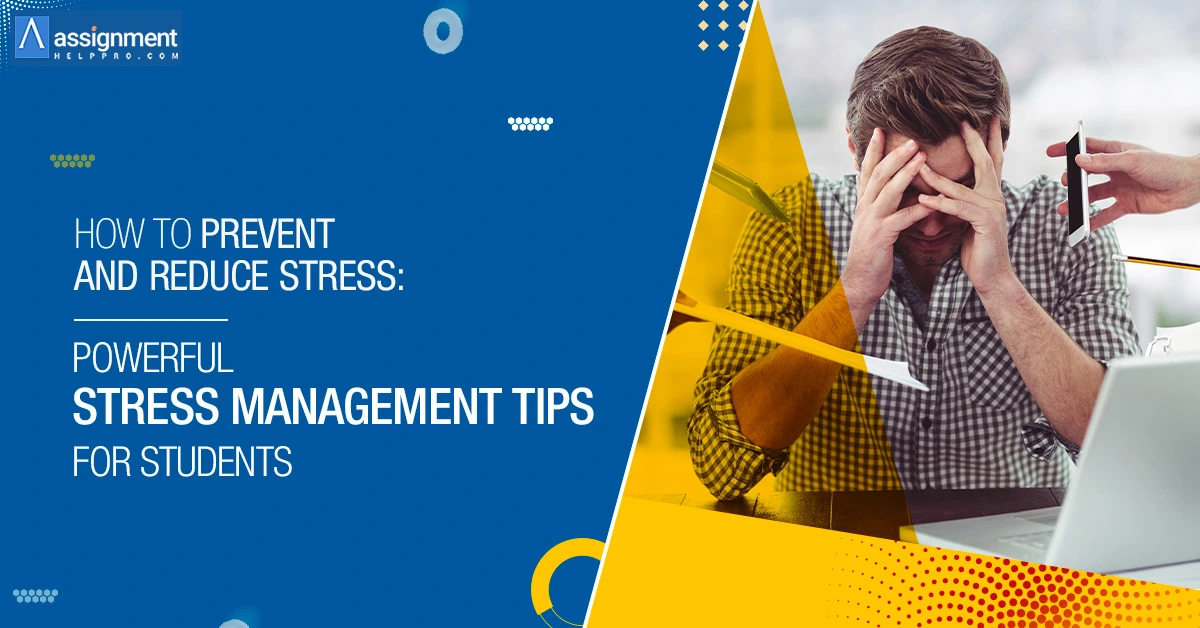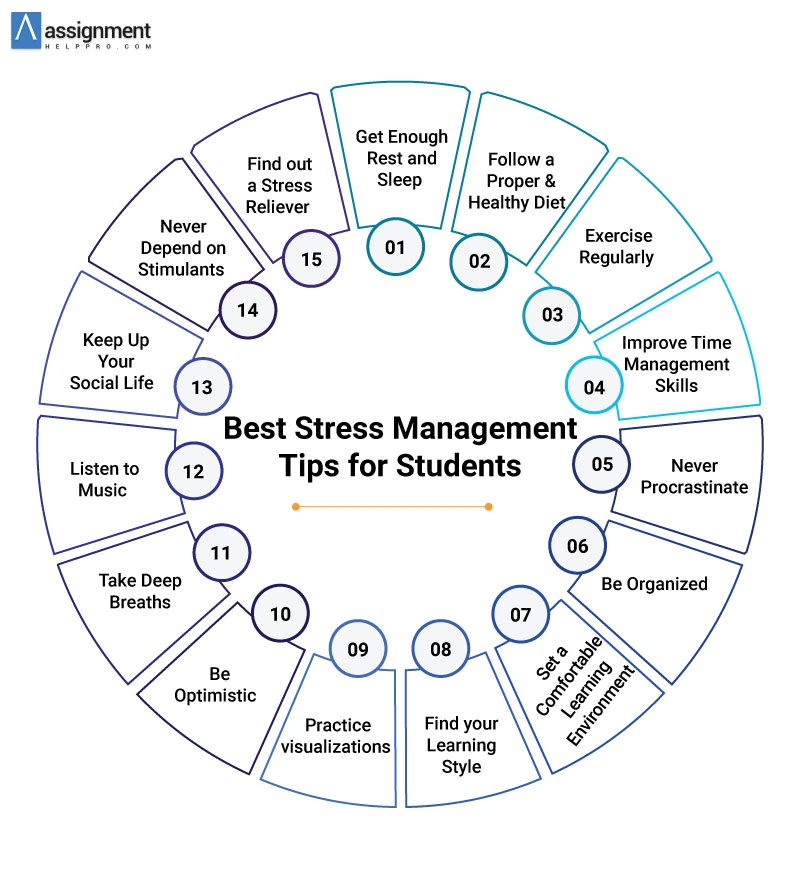Do you find it difficult to concentrate on your studies? Is something preventing you from being productive in academics? It might be stress, never take it lite. In recent times, stress is one of the serious health issues that school and college students commonly face in their academic life because of several reasons. Remember, if stress is left untreated, high possibilities are there for you to get more physical and mental health problems associated with it. So, try to find stress as early as possible and follow some effective stress management tips to reduce it, or else it will completely spoil your academic and career outcomes.

Don’t know whether you are suffering from stress or not? For your better understanding, here, we have explained briefly the definition, types, causes, and symptoms of stress. In addition to that, we have also suggested some powerful stress management tips for students who are experiencing stress in their lives.
If you wish to fight stress and excel in your studies and career, then continue reading this blog. Especially, from here, you can learn how to manage stress with effective stress management techniques.
What is a Stress Disorder?
It is a mental health condition that is activated when a human body experience or witness any positive (e.g., wedding ceremony, success meeting, etc.) or negative event (e.g., death, business loss, etc.) in life. Basically, every individual suffers from stress to a certain degree. But the way each individual responds to stress makes a big difference.
Whenever your brain identifies some pleasant or terrifying situation, it will trigger the adrenal gland in your body. The adrenal gland at such events would release cortisol and epinephrine hormones. These are nothing but stress hormones that have the ability to jump to flight-or-fight mode when required.
Usually, the stress hormones will fight positively against dangerous or scary situations. However, when the stress level increases, it becomes too hard for an individual to manage. High stress levels may cause a long-term critical effect on metabolism, memory, and blood sugar.
Different Types of Stress Disorders
Stress is commonly classified into different types based on its Affect and effect. Here, we have listed a few common types of stress disorders.
Acute Stress
It is a common stress type experienced by many individuals including students. Acute stress frequently occurs as a result of our day-to-day tasks like scoring low marks in exams, running late to class, etc. Usually, this stress type will heal rapidly and will only have a minimum impact on a person’s physical or mental health.
Chronic Acute Stress
A long-term stressful condition is identified as chronic acute stress. Say, for example, a student who is weak in academics may suffer from this type of stress that may lead to other problems like weight gain, difficulty in sleeping, anxiety, and so on.
Episodic Acute Stress
When an individual experiences acute stress several times over an extended period, it is said to be episodic acute stress. Migraine and tension headaches are some common symptoms of episodic acute stress.
Till now we had a brief look at stress and its common types. In the next sections, let us get to know about the common causes and symptoms of stress in students.
Signs and Symptoms of Stress in Students
How to know that you are under stress? Whenever you are exposed to any stress-triggering stimuli, you will typically experience a set of emotional, behavioral, physical, and cognitive reactions in your body. These reactions can be termed as signals that are raised by your body to notify you that you are in a stressful position.
Here are some common signs and symptoms of academic stress in students.
Physical Symptoms of Stress
- Fatigue
- Sweating
- Muscle tension
- Headache
- Stomach ache
- Increased blood pressure or heart rate
- Shortness of breath
- Vertigo
Emotional Stress Symptoms
- Increased worrying
- Helplessness
- Mood Swings
- Loneliness
Behavioral Symptoms of Stress
- Irregular sleep habits
- More drug or alcohol consumption
- Binge or reduced eating
- Reduced sex drive
Cognitive Symptoms of Stress
- Loss of memory
- Loss of concentration
- Disconnection from thoughts and feelings
- Negative outlook
If you suffer from any of these symptoms, then it means you are under stress. When your body shows any of these signs, better consult your doctor for medical advice. Stress is a serious disorder that should be treated quickly. If you don’t treat stress on time, then it may lead to other physical and mental health issues such as anxiety, sleep disorders, depression, and chronic muscle pain.
Why Do Students Suffer From Stress Disorder?
In most cases, determining the underlying cause of a disorder or disease is essential to successfully treating it. Therefore, it’s important to keep in mind that the first and most important step in managing stress is figuring out what’s causing it. Once you know what it is, it will be easier for you to follow any stress management advice that works for you.
The most significant causes of stress among college and school students are outlined below.
- Difficulty paying for education or tuition.
- Shy about interacting with teachers and classmates.
- When a person moves away from home for the first time, they may experience homesickness.
- Difficult to adjust to living with strangers in hostel rooms.
- On campus, unable to make new friends.
- Heavy Workload (more troublesome tasks or schoolwork to finish in a limited time)
- Inability to oversee time between training and temporary work.
- Difficulty coping with pressure from others.
- Examination fear.
- Problems with people.
- The family’s loss.
- The fear of failing
- A feeling of uncertainty.
- Competition with sports teams.
- Romantic relationships among teenagers
There is a high chance that your levels of stress will rise if any of these factors have a significant impact on you. So, take a look at yourself and see if any of the most common reasons for the stress disorder listed above bother you. Keep in mind, that you may also experience stress because of other reasons that are not listed here.
Best Stress Management Tips for Students
Currently, are you facing any signs of stress in your body? Do any of the above-mentioned reasons for stress disturb you? If yes, then you should immediately start practicing some effective stress management techniques and tricks for students.

Do you know how to manage stress? Actually, it is possible to handle stress by yourself, if you know the primary reason for your stress. But it needs more patience and practice. Once you figure out the cause of stress, try to relieve stress or develop your skills to cope with stress by following the powerful stress management tips discussed below.
Get Enough Rest and Sleep
Students who are loaded with heavy work often undergo a varying sleeping pattern or miss sleeping. Usually, when you don’t sleep properly, your body will experience critical health problems over an extended time. Also, it will become tough for you to concentrate on your studies or work, which in turn will have a great impact on your overall productivity.
Rather than working hard for a longer period without any break, taking a rest in the middle of the work for fewer minutes will make you more active, and will also enhance your overall performance.
Avoid following an irregular sleep schedule. Take a power nap when needed. Strictly have at least 8 hours of sleep a night.
Remember, if you get enough rest and sleep, then you can easily eliminate stress, stay healthy, and have a clear state of mind to boost your productivity.
Follow a Proper and Healthy Diet
Students who are under stress commonly don’t follow a proper diet. Particularly, in recent times, many students have developed the habit of skipping breakfast. Generally, your brainpower will double up when you take a proper and healthy diet. But when you fail to follow a good diet, you will not have the mental energy to work actively. So, make sure to eat nutritious food that has the power to fight stress and relax your mood.
Do you want to relieve stress and stay away from diet-related mood swings, light-headedness, and many more health-based problems? If yes, then maintain a healthy diet plan. The nutritious eating plan you follow will make you fit, energetic, and free from stress.
Exercise Regularly
When students get locked inside a busy academic schedule, they naturally forget to give significance to their physical fitness. Exercise is one of the effective stress management techniques that will refresh your mind as well as your body.
If you exercise regularly, you will fall asleep quickly which in turn will result in the reduction of stress levels. Also, exercise will give you a long and healthy life. So, throughout your life, do exercises daily.
Note that, it is not necessary to do hard exercises. Some simple and basic stretching exercises, walking, yoga, cycling, or jogging in the morning are enough to uplift your energy level and relieve stress. You can also participate in any sports activity to improve your physical fitness and mental health.
Improve Time Management Skills
Basically, students require more time to work on their studies and build their academic performance. However, many students don’t know how to manage time efficiently. Say, for instance, when you follow an irregular work schedule, it would become impossible for you to finish your work before the deadline. Especially when you miss your deadlines or don’t complete your exam preparation on time, your stress levels will automatically elevate.
So, to avoid stress issues, make sure to manage time properly. In particular, when you plan and stick to a proper work schedule, you can easily improve your time management skills.
Do you wish to perform well in your academics without any stress? Well, first, prepare a study schedule or a timetable. Whenever you prepare the schedule, divide your study or complex project into smaller sections and assign a particular time duration for each section or subsection to finish. Most importantly, try to manage your time as per the schedule you have prepared.
If you have a proper work schedule and execute it accordingly, then you can easily finish your work without extending your time. Remember, good time management skills will help you work progressively and achieve your aim without stress.
At the time of doing a task, set SMART (specific, measurable, achievable, relevant, and time-bound) goals because it is one of the best ways to complete work without becoming stressed.
Never Procrastinate
Due to laziness, many students often postpone their work. Actually, procrastination might be blissful at that moment, but, it may lead to stress in the future. So, avoid procrastination.
Instead of spending your late-night sleep hours on your homework, ignore your laziness and wisely manage your time. When you finish your work earlier, you will receive ample enjoyment time. Also, you can save a few more minutes to concentrate on other work.
How to avoid procrastination? Develop a plan to push through procrastination. For example, you can identify an accountability partner, or utilize any goal breakdown worksheet.
A medical study also states that habitual procrastination might be a sign of anxiety or ADHD.
Be Organized
To escape from stress, try to be organized. Especially, to take notes and keep track of all your assignments and academic work, and maintain a system of organization.
Remember, being organized has numerous advantages. In particular, when you stay organized, you will not have the chance to forget your exam dates and deadlines. Most importantly, it would help you clear all the dumps and disorganized things that exist in your mind.
Do you want to prevent your academic stress? Great! For all the academic work you do, plan and prepare a filing system, a work schedule, or a calendar. For organizing your work, you can use a manual method, or rely on any software or online work management tools.
Set a Comfortable Learning Environment
Setting up a proper study environment is one of the powerful ways to reduce your academic stress and learn peacefully. Basically, when you sit and learn in a disturbing environment, you can’t focus on your studies for a long time. Easily you will get distracted in a loud and noisy environment.
Therefore, before you begin learning, first, check what environment is suitable for you. Some students will prefer to learn while listening to music and a few more will wish to study in a calm environment. As each individual prefers a different study environment, to learn peacefully, we recommend you prepare a comfortable learning environment according to your preference.
When learning, you can also do aromatherapy, a good stress reliever. The peppermint essential oil used in the therapy would help your brain to stay active while studying.
Find your Learning Style
As per the learning style theories, students learn a concept in various ways. The most common types of learners include auditory, visual, reading/writing, and kinesthetic.
When learning, auditory learners will give more preference to music, discussion, and lectures. Visual learners will rely more on pictures, movies, and diagrams. The reading/ writing learners will find it easy to learn by reading the textbooks and taking notes. On the other hand, kinesthetic learners give more significance to experiments, movements, and hands-on activities.
Out of the 4 different types of learners, find in which category you will fall. Mainly, in order to be successful in academics, after you have found out your learning style, modify your study practice according to your learning style.
Note that, if you know how to study, then without any stress, you can quickly learn and understand the concepts.
Also, you can stay focused on your academic tasks by following any specific learning skills or techniques. Definitely, the learning skills you possess will enhance your productivity and help you relieve stress.
Practice Visualizations
Visualization is another effective stress management technique the students should practice. Particularly, when you imagine yourself fulfilling your dreams or goals, you can effortlessly eliminate stress and boost your academic performance.
Out of various stress management techniques, visualization is a simple and easy method that would calm you, kill your stress, and turn down the anxious response of your body. Therefore, for a few minutes, in detail, visualize anything that you wish to happen in your life.
Regular practice of guided imagery would tune you to actively work towards your goal and achieve it. Also, it would strengthen your confidence level and reduce stress.
Be Optimistic
Scientific studies have proven that students with positive thoughts are less stressed, healthier, and more successful. So, increase the level of optimism because it would help you to easily bounce back from failures and reach your goals.
One of the best ways to develop a stronger sense of optimism is positive self-talk. Hence, train your brain to generate positive thoughts whenever you need them.
Most importantly, with the help of your optimistic thoughts, you can shape yourself to perform better in your studies as well as in your career.
Take Deep Breaths
Do you want quick relief from stress? Calm down! Whenever your body faces stress, switch off your thoughts and take a deep breath.
Basically, breathing exercises have the power to give peace to your soul. So, learn and practice simple breathing exercises. No matter where you are and what you do, to relieve stress in minutes, instantly do a breathing exercise.
For example, you can reduce anxiety before or during tests at the examination hall by taking deep breaths.
Listen to Music
One of the best stress relievers that have a lot of cognitive benefits is Music. When you play music, it would help to stimulate your mind and pull you out of stress.
Mainly, for your mind relaxation, you can rely on music. For instance, you can play classical music while studying, tune up peppy music to stay mentally active or relax your mind by listening to your favorite songs
Keep Up Your Social Life
In the modern digital era, students don’t have time for social life. In order to concentrate on their studies and to work on assignments and project work, many studious people often cancel their plans with family and friends. On the other hand, there are a few students who love spending their time on social media, phones, and PlayStations instead of interacting with their family members.
Note that, ignoring social support would raise your stress levels. Also, research states that you can experience success in your academics as well as in your career when you maintain a strong network of friendships.
If you want to stay without stress, give more significance to your social life. Frequently, sit and watch a movie with your friends or have dinner with your family to give a temporary break to your brain from your busy work schedule.
Never Depend on Stimulants
Don’t drink coffee and energy drinks to stay awake during late-night study sessions. Because drinking them would smash your mind later.
Generally, stimulants like this would rapidly raise the cortisol levels in the body and in turn, would lead to the physical effects of stress.
So, avoid energy drinks and caffeine-based drinks to lower your stress level.
Find out a Stress Reliever
It is impossible to avoid stress completely. But by finding out a healthy way, you can effectively handle your stress.
In general, to relieve stress, there are plenty of stress busters and relaxation techniques available. Out of them all, some of the effective stress outlets include getting massages, building a new hobby, doing exercise, painting an image, cooking, meditation, and so on.
If you want to relax your mind, then based on your interest, find a stress reliever and practice it regularly.
Conclusion
According to the American Institute of Stress, nearly 4 in 5 college students are suffering from stress. If you are also one among them, then try to follow the stress management tips suggested in this blog so that you can stay active and excel in your studies without tension. Most importantly, in order to avoid entering a chronic stress state, practice stress management techniques regularly



